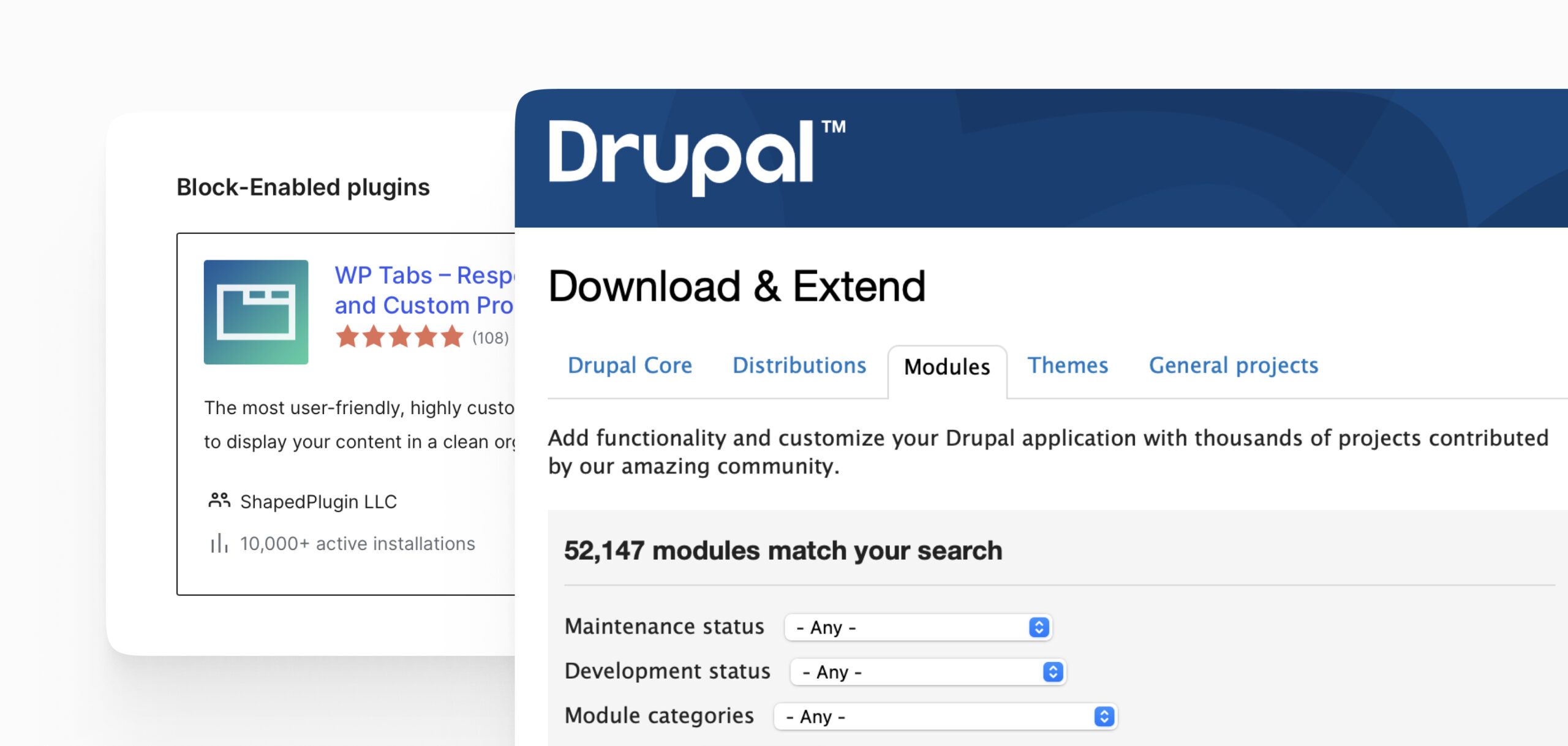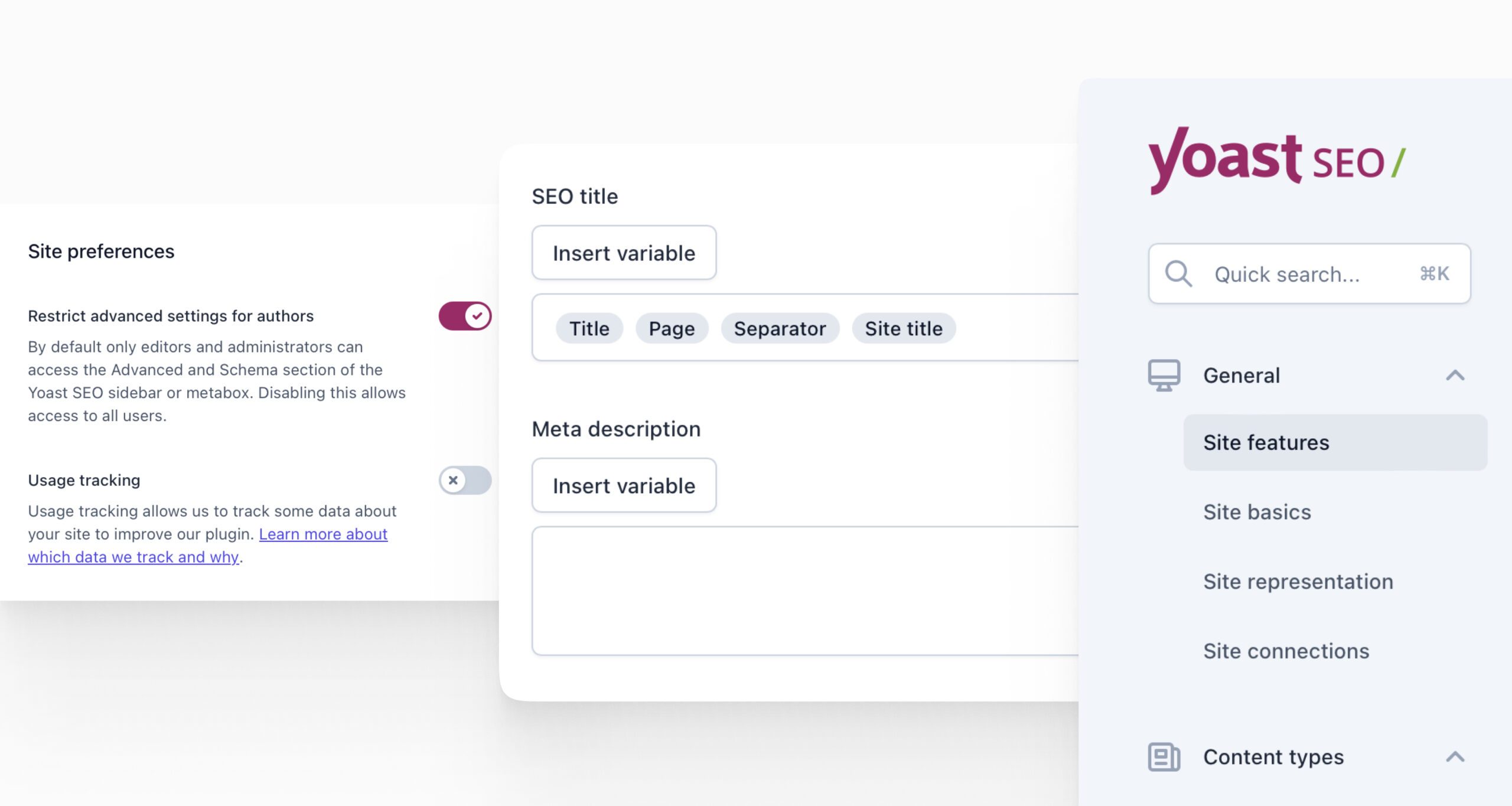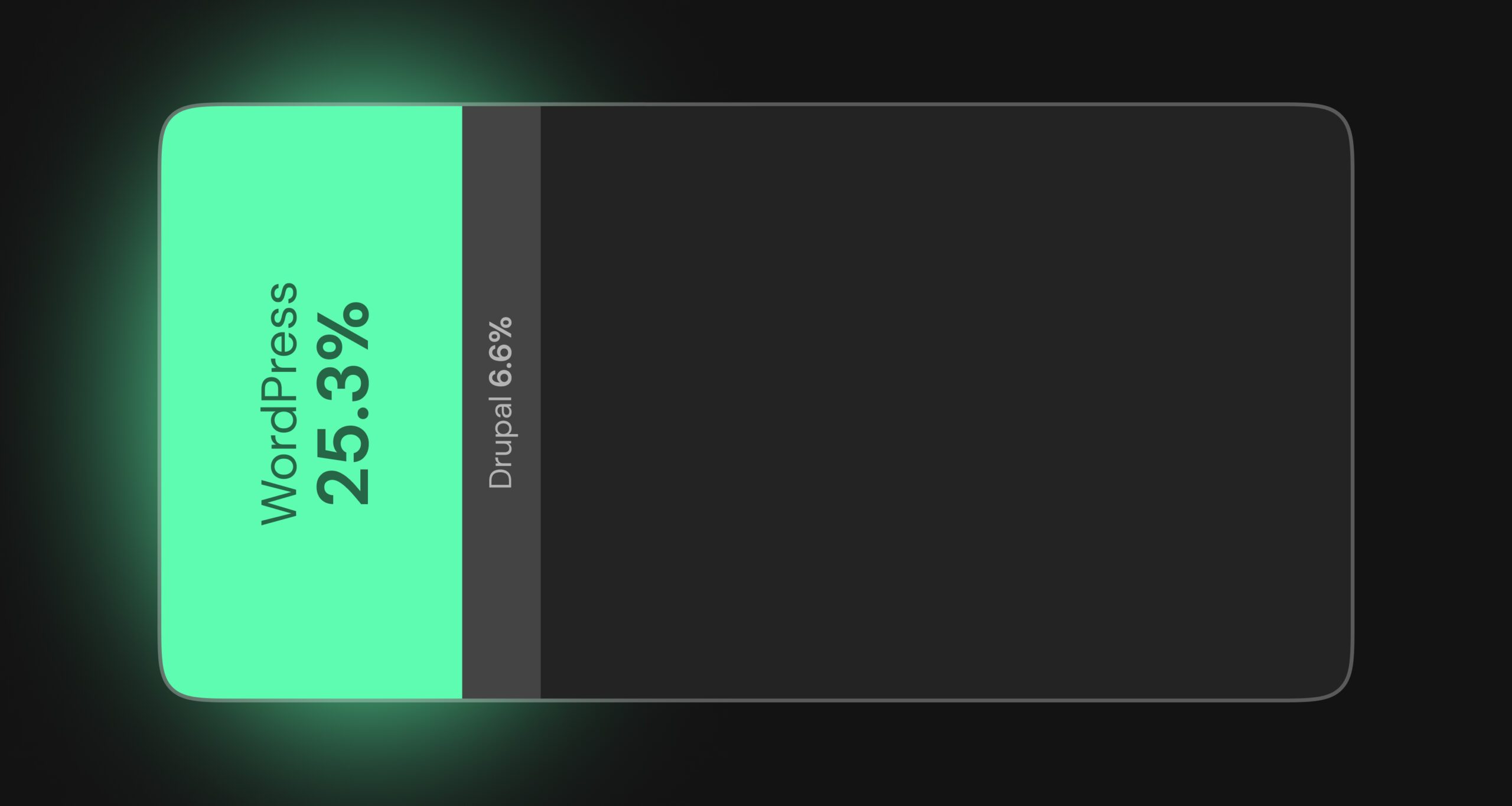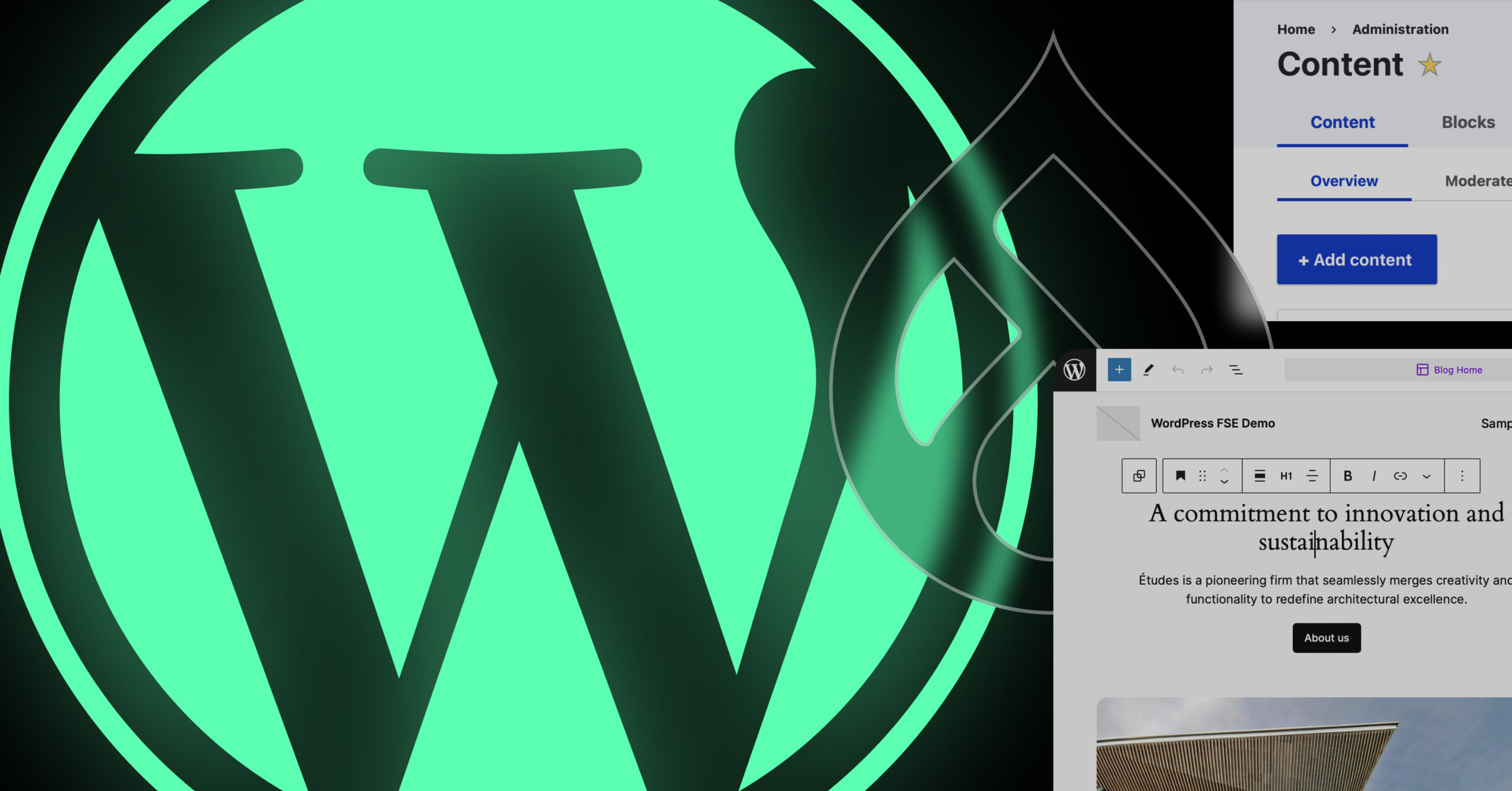Choosing the right Content Management System (CMS) is crucial for enterprise organisations looking to establish a robust digital presence. WordPress and Drupal are two of the most popular CMS platforms, each offering unique benefits.
However, WordPress consistently emerges as the preferred choice for enterprises due to its flexibility, scalability, user experience, and cost-effectiveness. Here’s why WordPress outshines Drupal in the key areas enterprises need most:
1. Flexibility and customisation
WordPress: WordPress is known for its unparalleled flexibility, offering over 60,000 plugins and thousands of themes, allowing enterprises to tailor their websites to move fast and meet specific needs without extensive coding. This vast plugin ecosystem enables quick and easy additions of features like e-commerce capabilities, SEO tools, and advanced analytics. Its open-source nature also allows developers to create custom solutions, making WordPress adaptable to almost any business requirement.
Drupal: While Drupal is also flexible and powerful, it requires more technical expertise to customise. Drupal’s some 50,000 modules provide extensive functionality, but implementing them often requires a deeper understanding of coding and development. This complexity can increase development time and costs, making it less accessible for organisations without a dedicated development team.

2. Scalability for large enterprises
WordPress: WordPress is highly scalable, capable of handling large volumes of traffic and vast amounts of content, making it ideal for growing enterprises. It powers some of the most significant websites globally, demonstrating its ability to support enterprise-level operations effectively. With the right infrastructure and optimisations, WordPress can scale to meet the needs of any large organisation.
Drupal: Drupal is also scalable and is known for handling complex, high-traffic sites. However, scaling Drupal often requires more technical expertise and a more substantial initial investment in development. While it can manage complex data architectures well, its scalability comes with increased complexity, which might not be necessary for all enterprise needs.
3. User experience and ease of use
WordPress: One of WordPress’s greatest strengths is its user-friendly interface. Its intuitive dashboard and easy-to-use content editor make it accessible to non-technical users, allowing marketing teams, content creators, and other stakeholders to manage and update content efficiently. This ease of use reduces training time and allows for quicker adoption across teams.
Drupal: Drupal offers a more complex user experience, which can be challenging for those unfamiliar with it. Its interface is less intuitive compared to WordPress, requiring more training and expertise to manage effectively. While it is powerful, the complexity can be a barrier for organisations that need a simple and efficient content management process.

4. SEO capabilities
WordPress: SEO is crucial for online visibility, and WordPress excels in this area. With plugins like Yoast SEO and All in One SEO Pack, WordPress provides comprehensive tools to optimise content for search engines. These plugins offer features such as keyword optimisation, meta tags management, and XML sitemap generation, making it easy for enterprises to enhance their SEO strategies.
Drupal: Drupal also offers robust SEO capabilities, with modules designed for SEO optimisation. However, setting up and configuring these modules can be more complex than using WordPress plugins. For enterprises that prioritise ease of use and quick implementation of SEO best practices, WordPress offers a more straightforward solution.

5. Security
WordPress: Security is a priority for WordPress, with regular updates and a large community of security-focused developers focused on maintaining the platform’s safety. Numerous security plugins, such as Wordfence and Sucuri, help enterprises implement advanced security measures like firewalls, malware scanning, and two-factor authentication. Managed WordPress hosting providers also offer enhanced security features, further protecting enterprise websites.
Drupal: Drupal is known for its robust security features, and its strict security protocols and dedicated security team provide a strong defence against threats. However, the complexity of Drupal’s security setup can require more technical knowledge, making ongoing security management more resource-intensive.
6. Cost-effectiveness
WordPress: WordPress offers a cost-effective solution, particularly for enterprises. As an open-source platform, it is free to use, and many plugins and themes are available at no cost. Enterprises can invest in managed hosting and premium plugins based on specific needs, allowing for flexibility in budgeting. The ease of use also reduces the need for extensive training and development time, further lowering costs.
Drupal: Drupal can be more expensive to implement and maintain due to its complexity. The need for specialised development skills often results in higher initial setup costs and ongoing expenses for maintenance and updates. While Drupal’s capabilities justify the cost for certain use cases, WordPress provides a more budget-friendly option for enterprises that don’t need the high level of customisation that Drupal offers.
7. Popularity
WordPress: WordPress powers over 40% of all websites globally, making it the most popular CMS by a significant margin. Over 25% of the top 10k websites in the world use WordPress. This widespread adoption has created a vast ecosystem of developers, designers, and contributors, ensuring a wealth of resources, plugins, and themes. Its popularity also means that finding skilled developers and support is relatively easy and cost-effective.
Drupal: Drupal, while popular, holds a smaller share of the market compared to WordPress – it’s only used by around 6% of the top 10,000 websites globally. It is widely used by governments, educational institutions, and larger organisations that require specific functionality or enhanced security. However, the smaller user base can mean fewer readily available resources and less variety in themes and plugins.

8. Community support
WordPress: The WordPress community is one of its strongest assets. With millions of users, developers, and contributors worldwide, there is a wealth of knowledge and support available. Community forums, documentation, tutorials, and regular meetups contribute to the ongoing growth and improvement of the platform. The community-driven nature of WordPress ensures continuous innovation and a rapid response to emerging web trends.
Drupal: Drupal also has a strong community, particularly among developers. It offers extensive documentation and community support through forums, events, and online resources. However, the community tends to be more technically oriented, which may be less accessible to non-developers or those looking for user-friendly guidance.
While Drupal offers strong capabilities for specific use cases, WordPress stands out as the best choice for enterprise organisations due to its flexibility, scalability, ease of use, SEO friendliness, security, cost-effectiveness, popularity, and robust community support. WordPress provides a comprehensive, adaptable platform that meets the diverse needs of enterprises, enabling them to grow and thrive in a competitive digital landscape. Whether launching a new project or scaling an existing digital presence, WordPress offers the tools and community backing necessary to achieve business goals.
